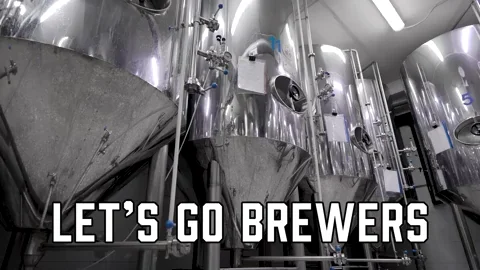Have you ever homebrewed beer?
Do you love chemistry, creativity, and want a hands-on career?
Brewing is more than just combining water, grain, hops, and yeast. It often involves being creative and a beverage foodie. Don't get me wrong...as a brewer myself, it can be hard work, but incredibly fulfilling!
Check out what it takes to get into this exciting and growing field!

What does a brewer do?
So, is it all about adding delicious things to hot water until we're left with a foamy, bubbling brew? Well, kind of, but there's also some paperwork involved!
Responsibilities can really vary depending on the size of the brewery and brewery type. Imagine being responsible for all the items in a small store versus a large warehouse!

Typical responsibilities:
Manage inventory
Gather ingredients
Complete brewing process
Document brewing process
Clean and sanitize equipment
Other possible responsibilities:
Recipe development
Collaborate with sales and taproom team
Representing the brewery at events
Brew house tours
Train assistants

Hey! How do you brew?

Here is a VERY brief overview of the brewing process in 7 main steps:
Milling: Crushin' grain!
Mashing: Mix grain with hot water.
Lautering: Here the goal is to extract additional sugars and separate the wort from the grain.
Boiling: The wort is boiled and hops are added.
Fermentation: Yeast is added to convert fermentable sugars to alcohol and CO2.
Carbonation: The beer is conditioned and carbed.
Packaging: Beer is moved from the bright tank into kegs, cans, or bottles.
Did you know?
How do you become a brewer?

Here are 4 questions to help you decide if you can be un-beer-lievably hoppy working as a brewer...
1. Would you enjoy a front-row seat to fascinating chemical reactions?
Here are some chemical processes that are key to make beer taste the way it does!
You'll be in charge of facilitating:
Amylase enzymatic reaction: breaks starches in sugars
Fermentation: converts sugars to ethanol
Biotransformation: involves aromas and flavors
2. Do you love working with your hands?
Carrying 50-lbs grain bags? No problem!
Brewers are hands-on workers. You'll be moving heavy grain bags, lifting large hoses to move beer from one tank to another, transferring kegs to pallets, and other laborious tasks.
3. Do you mind cleaning? A lot, of cleaning...
While this video doesn't show an everyday occurrence, cleaning is going to take up a large portion of your day and you will be handling some heavy duty chemicals. Brewers are very careful to keep all equipment clean for product cleanliness and equipment longevity.
 Video courtesy of Daily Mail's TikTok
Video courtesy of Daily Mail's TikTok
4. Are you results driven?
Let's face it...the best part of being a brewer is the end product! You get to use your creativity and knowledge to create something that everyone who comes to your brewery will enjoy.

Did you know?
Subscribe for more quick bites of learning delivered to your inbox.
Unsubscribe anytime. No spam. 🙂
Pick the future brewer!

Jordan
Seeking a hybrid or remote position
Can maintain a strict schedule
Enjoys beer
Thrives in predictable environments

Jamie
Seeking a flexible schedule
Can work long hours during peak times
Loves beer
Loves hands-on work and is meticulous
Quiz
Who do you think would enjoy a career in brewing?
Where could you work?
Many brewers start as homebrewers, volunteers, and brewery assistants. Courses and schooling can be beneficial, but they're not necessary. Hands-on experience is what really matters. Get to know the process and how to problem-solve when something doesn't go according to plan!
Breweries are opening every day all over the world and there are thousands of job postings.
 Where should you look?
Where should you look?
You can also ask your local brewery. They may be hiring or know about another local brewery that is!
Did you know?
What does it pay?

Well, it depends on where you are and the size of the brewery!

You can expect a salary anywhere from $59,000 to $109,000 a year in the US.
As you can imagine, larger production breweries pay more.

You can expect a salary anywhere from $37,000 to $60,000 a year in Canada.
Ontario holds the highest number of breweries in Canada!
Take Action
You can take steps right now to be a brewer, no matter your experience!

Your feedback matters to us.
This Byte helped me better understand the topic.
